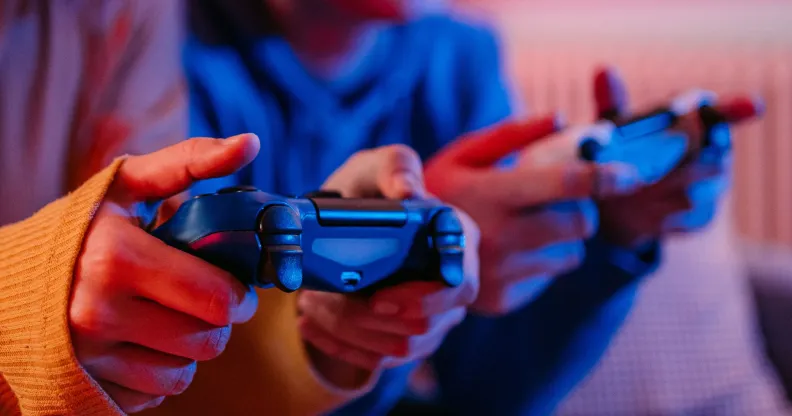LGBTQ+ indie game developers hit back at ‘worrying’ new Unity fees for installs

LGBTQ+ devs are concerned about the new price policy from Unity. (Getty)
Gaming tech company Unity has announced a controversial new fee for game developers using its engine and LGBTQ+ indie developers aren’t too pleased.
The tech behemoth, best known for its video game development engine, announced its new price models for games that use its platform on Tuesday (12 September).
The development engine is used in the creation of games and is a foundation of thousands of famous titles, including Cuphead, Pokemon GO and Fall Guys: Ultimate Knockout.
In a lengthy post on X, formerly Twitter, Unity wrote that companies who have produced “successful games” that generate revenue over a certain threshold will be charged for each individual time their game is installed by a customer, beginning on 1 January 2024.
There will be no charge to gamers, or the people who install the games.
“We looked for ways to lessen the impact on developers, and provide ways to bring the Runtime fee to zero,” Unity wrote.
“If you’re using any of our ad products, Unity Gaming Services or cloud services, etc. please contact us to discuss discounts.”
The decision was met with overwhelming backlash from developers large and small, with many saying the company has “broken trust” between itself and games developers.
Not only have opponents to the policy argued that it will punish newer, successful developers, but projects that have long stood the test of time could now face serious financial issues.
LGBTQ+ developers also pointed out that this would only be exacerbated for queer indie devs, who already face issues around representation in the industry and discrimination.
Trans indie developer, Robin, told PinkNews that he believes the move would hurt queer indies because fewer free, easy-to-use game engine options would be out there.
“It’s been frustrating because the change is going to take place very quickly,” he said. “It’s worrying to think that a small queer company becoming successful could be harmed by this.
“The idea that Unity can spring this change, on something that devs don’t earn money on, is terrifying.
“Many people are worried and [want] to switch engines on very loved projects.”
A lack of transparency in how the downloads will be tracked has also worried developers like Robin, who said that the company’s vague statements about its tracking system “does not bring comfort.”
Unity ‘can get f***ed’ veteran developer says
Garry’s Mod and Rust developer, Garry Newman, who uses Unity for many of his successful projects, wrote a blog post questioning the installs system too, while adding that Unity “can get f**ked“.
“There have been many reasons pointed out why this is a bad idea,” Newman wrote.
“Tracking installs is messy. Piracy, reinstalls, new computers, giveaways, bad actors. There are lots of reasons why it isn’t feasible.
“It makes you wonder how they could think it’s a good idea.”
Following the immense backlash, which saw high-profile games developers publicly shaming the company or even outright threatening to delist their games from storefronts, Unity wrote that the development fee threshold would only activate after a set limit.
“A large majority of Unity Editor users are currently not paying anything and will not be affected by this change. The Unity Runtime fee will not impact the majority of our developers,” it claimed.
In a later post, Unity clarified that it only plans to count charges for fresh installs on new devices. This will not include “fraudulent installs charges” or “trials, partial play demos, and automation installs.”
This would affect games including Cities: Skylines, Hollow Knight, Beat Saber, Genshin Impact, Untitled Goose Game and thousands more.
Among Us developers Innersloth, which made the game in Unity, also criticised the annoucement, saying it would be forced to “delay content and features our players actually want” to move the game to a new engine, which is an incredibly arduous process.
Unity also claimed that the policy would only target a small number of developers who hit a “substantial scale in downloads”, though it did not clarify what specific level of success would warrant the fees.
“This means a low or no fee for creators who have not found scale success yet and a modest one-time fee for those who have,” Unity wrote on X.
The tech company’s stock plummeted in the days following the announcement, which was made just days prior to several executives selling a hefty amount of Unity shares.
CEO John Riccitiello sold 2,000 Unity shares on 6 September – a week prior to the announcement – having sold a total of 50,610 shares in 2023 overall.
Riccitello previously worked for Electronic Arts, which was awarded Consumerist’s “Worst Company in America” twice in a row in 2012 and 2013 due to its monetisation mechanics, which have been described as exploitative.
Unity’s president of growth, Tomer Bar-Zeev, sold the most amount of shares by far at around 37,500 on 1 September, roughly totalling $1,406,250, according to Kotaku.
How did this story make you feel?

